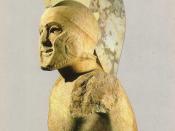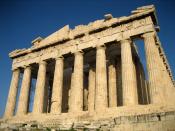We are about to explore the roots of two political systems: totalitarianism and democracy. Both forms exist in the modern world, but the roots for each can be found in ancient Greece. Both were bitter rivals and despised each other.
The form of culture of totalitarianism had its roots in the ancient Greek city-state of Sparta. Totalitarianism means of, relating to, being, or imposing a form of government in which the political authority exercises absolute and centralized control over all aspects of life, the individual is subordinated to the state, and opposing political and cultural expression is suppressed. Within Sparta there existed three groups: slaves, known as Helots; Spartan females, who were taught to be fit, brave, and patriotic; and Spartan males, all of whom became warriors. Newborn males judged to be weak were left to die of exposure. At the age of seven, boys left home to live in barracks and receive military training from older boys.
Boys went barefoot, wore minimal clothing (even in winter), practiced all forms of athletics, and received military instruction. They married at age 20 but continued to live in the barracks. The Helots provided the necessary food and labor for Spartan males and females.
The form of culture of democracy had its roots in the ancient Greek city-state of Athens. In the ancient Greek city-state of Athens all citizens participated in Athenian governmental activities. All citizens were equal before the law and participated in the government. Slaves and women, however, were not allowed citizenship. Athenians eventually abolished slavery and developed a direct democracy where citizens chose the members of the powerful Assembly. Athenian youth were encouraged to develop artistic and intellectual talents to such a degree that historians refer to their developments in the arts and politics as a "Golden Age."
After reading that most would be surprised to learn that between 480 and 324 B.C., Athens won more events in Olympic competition! Sparta and Athens each had totally different societies and governments. It's amazing how both city-states didn't collapse for a long time and how one didn't take over the other one.
When comparing societies of Athens and Sparta, they are totally different. Spartans had upper classes which had all power and privilege. Helots did all the nonmilitary work. All education focused on military strategies and war. Athens made all citizens equal. Women and slaves were excluded from becoming citizens. Their education focused on physical and mental skills.
I feel that there is two ways to look at both of these city-states in good ways. The Sparta city-state was well trained for war. It was run in an un orthodox way, a way that we would most likely never hear about now. The Athens city-state I felt was better run. It gave more people chances in society. They were well trained for every day life not war. The Athens way of training was more effective to result in a prosperous society. The Spartans would probably not be able to run a prosperous society with all their beliefs and ways of life. The Athens all had responsibilities and would have kept that type of society going longer.
The Athens city-state resembles the United States now. Both allow all citizens to be equal and both education resemble each other. It amazing how the Athens city-state didn't get overthrown by the Spartans and how the Spartans didn't decline earlier with how they were run. Only once in ancient Greek could this have ever happened.



Sparta
Spartans also would leave babies that were not in perfect health outside the city walls to die. I couldent find anything citing this but I took a class so I'm sure it's availabe somewhere.
1 out of 1 people found this comment useful.